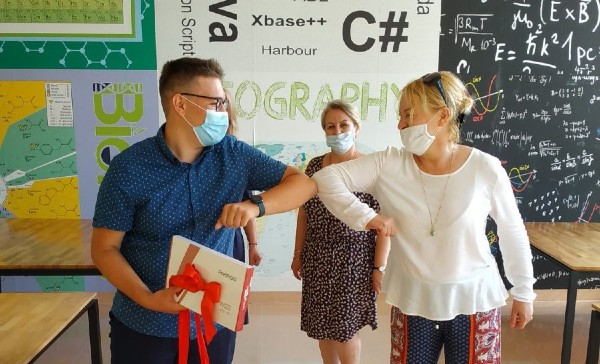 North West Balkans
North West Balkans
Languages
Experimental chemistry: Putting knowledge into practice through STEM way of learning

“I started learning chemistry by turning all the knowledge I acquired during class into action during my free time, if possible,” says Irfan Zivojevic, a first-grader at the Third Gymnasium Sarajevo who won the first place in experimental chemistry for first grades in his school. The goal of the competition was to prove the influence of factors on the speed of chemical reactions in a fun way and through practical experiments and Irfan won a tablet as the award for the won first place, ensured through the #ENABLEBiH project.
The Third Gymnasium Sarajevo is one of 12 primary and high schools in BiH in which modern STEM labs were equipped through Enhancing and Advancing Basic Learning and Education in Bosnia and Herzegovina (ENABLE BiH) project, supported by USAID BiH.
As the school principal, Senada Salihovic, explains to us – “Today's way of education in our country is mainly reduced to learning and memorizing facts, which is why students do not gain lasting knowledge, nor do they notice where the learned material from certain subjects could be applied. With the STEM way of teaching, students really study phenomena, solve problems and construct solutions independently.”
The teacher's role it to introduce the problem and coordinate the learning process, while the student is at the centre, adds Salihovic. “STEM education breaks the fear of failure and increases the desire to learn through trial and error, which means students learn how to study, not how to learn. Students in STEM classes are trained to be able to explain what they know, they can express themselves because they share their knowledge and thus give the opportunity to be asked about their work and share their knowledge.”
Experimental chemistry competition in the Third Gymnasium was held in the spring months of 2020, during Covid-19 pandemic. Besides learning, the goal was also to provide additional fun challenges to students and help them cope with consequences of pandemic, reduced movement and extra free time. The classes were held online and different online tools were used for extra curricula activities.
“At the time of the virus contagion, many stores were closed and my movement was restricted so I had to make things work for mw. I live in an apartment and therefore I don’t have a yard where I could escape and forget about the virus. This type of research gave me an idea that my parents supported. We made a small home lab where I can spend my free time. The isolation went much easier this way,” says Irfan.

Irma Ibrovic was also contented with the new way of learning. “This form of learning differs from the usual in that students do a lot of independent research on a given topic and learn from a variety of sources. The most interesting thing for me was that I was able to experimentally prove a statement and that I had the opportunity to try to pass on my knowledge to others.”
Professor Edina Hodžić says all students were thrilled with this type of activities. “Most of them were euphoric and showed competitive spirit. New ideas were coming on the go as well as unforeseen circumstances such as inadequate concentration of hydrogen peroxide available to students to have a visible effect and prove their hypothesis. Nevertheless, they all managed to prove the factors ther were tasked with.”
Another student, Alen Zubovic, is also happy ha was tasked with research work. “This model differs from the standard, in my opinion, because the knowledge is being connected. This model provides an answer to the omnipresent question ‘And what do we need this for?’ We always ask the question why learn something we can’t apply. I believe that STEM enables students to study those areas they want, and to get out of the limitations imposed on them by the school system.”
His fellow student, Belma Lojo, agrees. “STEM classes are different and more demanding, and yet more interesting. My research on the subject of radioactivity I will forever remember and the conclusions I came to, and where it all has its application.”
The ENABLE BiH project began in September 2016. The overall purpose of the project is to contribute to the improvement of learning outcomes in primary and general secondary education in BiH. Specifically, Phase I of the ENABLE-BiH was intended at helping BiH students acquire key competences necessary to participate in the knowledge-based economy, and become future drivers of the economic development of the country. Building on the program’s Phase I objective, Phase II implementation focused on advancing USAID BiH goals of improving STEM education in Bosnia and Herzegovina by implementing the new Operational Teaching Curriculum in schools and rolling out new standards and guidelines for improved STEM teaching methods in pre-service university programs.